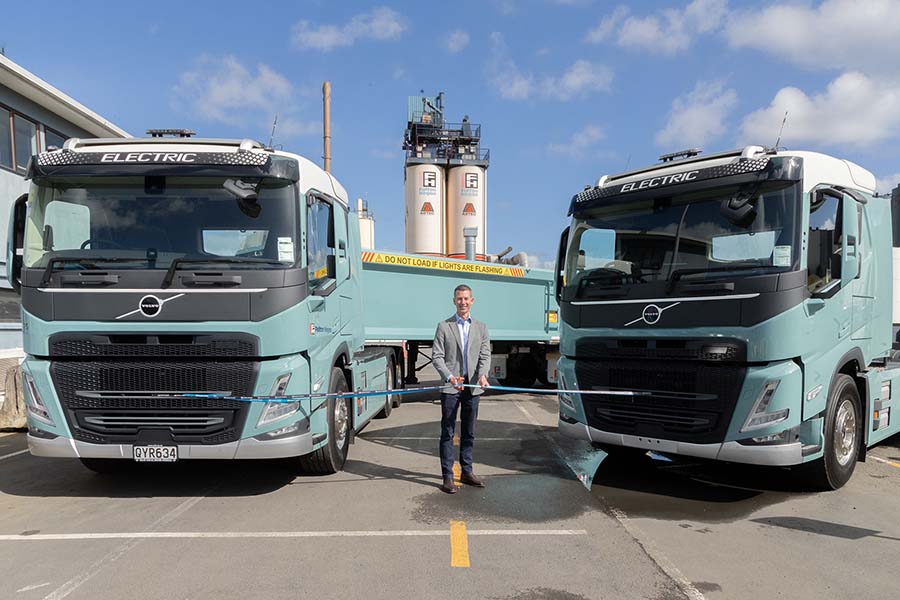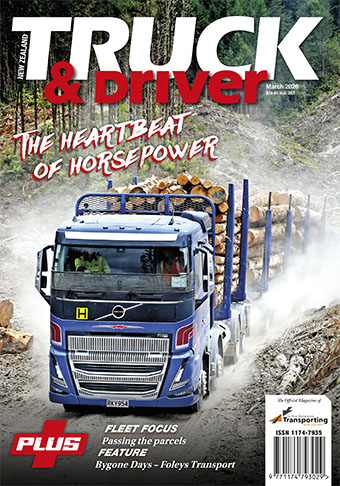Aeolus Truck & Driver News


Electric Volvos join Fulton Hogan fleet
Aeolus Truck & Driver News
Two new Volvo FM Electric 6x4 trucks going to work on Auckland roads will deliver some vital understanding for the future role of electricity as an energy source for heavy trucks.
Purchased by Fulton Hogan with support from the EECA (Energy Efficiency and Conservation Authority) Low Emissions Heavy Vehicle Fund, the Volvo duo will each transport up to 16,000kg of asphalt from plants in Penrose and Drury to sites around the city.
Fulton Hogan is already working with Volvo and EECA to pioneer other large electrically powered equipment and this is their first collaboration with road-going vehicles.
Fulton Hogan NZ Chief Executive, Ben Hayward, says the launch of the Volvo FM trucks is another learning step on the path to a low emissions fleet.
...Two new Volvo FM Electric 6x4 trucks going to work on Auckland roads will deliver some vital understanding for the future role of electricity as an energy source for heavy trucks.
Purchased by Fulton Hogan with support from the EECA (Energy Efficiency and Conservation Authority) Low Emissions Heavy Vehicle Fund, the Volvo duo will each transport up to 16,000kg of asphalt from plants in Penrose and Drury to sites around the city.
Fulton Hogan is already working with Volvo and EECA to pioneer other large electrically powered equipment and this is their first collaboration with road-going vehicles.
Fulton Hogan NZ Chief Executive, Ben Hayward, says the launch of the Volvo FM trucks is another learning step on the path to a low emissions fleet.
“For electricity to replace fossil fuel in large equipment like this we need organisations who are committed to investing in change, and we’re grateful to be working with two like-minded organisations to take this step,” Ben says.
“Across our wider fleet, the potential opportunities to reduce emissions, with time, are enormous.”
General Manager for Volvo Trucks NZ, Scott Holt, says transitioning to low carbon fleets requires leaders like Fulton Hogan to deliver learnings that will enable others to follow.
“We’re committed to working to support the team’s commercial, safety and sustainability goals across their operations to help achieve this,” Scott says.
The Volvo FM Electrics are equipped with a 450kWh battery pack. Modelling the efficacy of the vehicles prior to purchase showed their ‘sweet spot’ was short duration, cyclic trips in urban/suburban areas.
The modelling indicates a 152km range with a full 16,000kg load, using 2.92 kWh/km at an average speed of 43km/h, including 38kWh of regenerated energy.
If these figures are consistent with actual use, this will reduce emissions by a combined total (both trucks) of approximately 150 tonnes CO2 annually compared with diesel powered trucks performing the same task over 60,000km per year.
In addition to the environmental benefits, there is a focus on safety with the introduction of the new Volvos.
The trucks are paired with new trailers designed and manufactured in Hamilton by Transport Trailers Ltd to eject their load without the need for tipping.
This design is a significant safety improvement in terms of eliminating tip-over risk and overhead utility strikes.
Fulton Hogan is committed to introducing new carbon emission-reducing technology and equipment where the technology is available and meets operating needs.
In March, for example, Fulton Hogan electrified the crushing and conveying plant at New Zealand’s largest hard rock quarry – Stevenson’s Drury Quarry.
The electrification has substituted for three diesel mobile crushing trains, three diesel excavators, three diesel loaders and three diesel dump trucks at the quarry.



 + EQUIPMENT GUIDE - FREE
+ EQUIPMENT GUIDE - FREE
